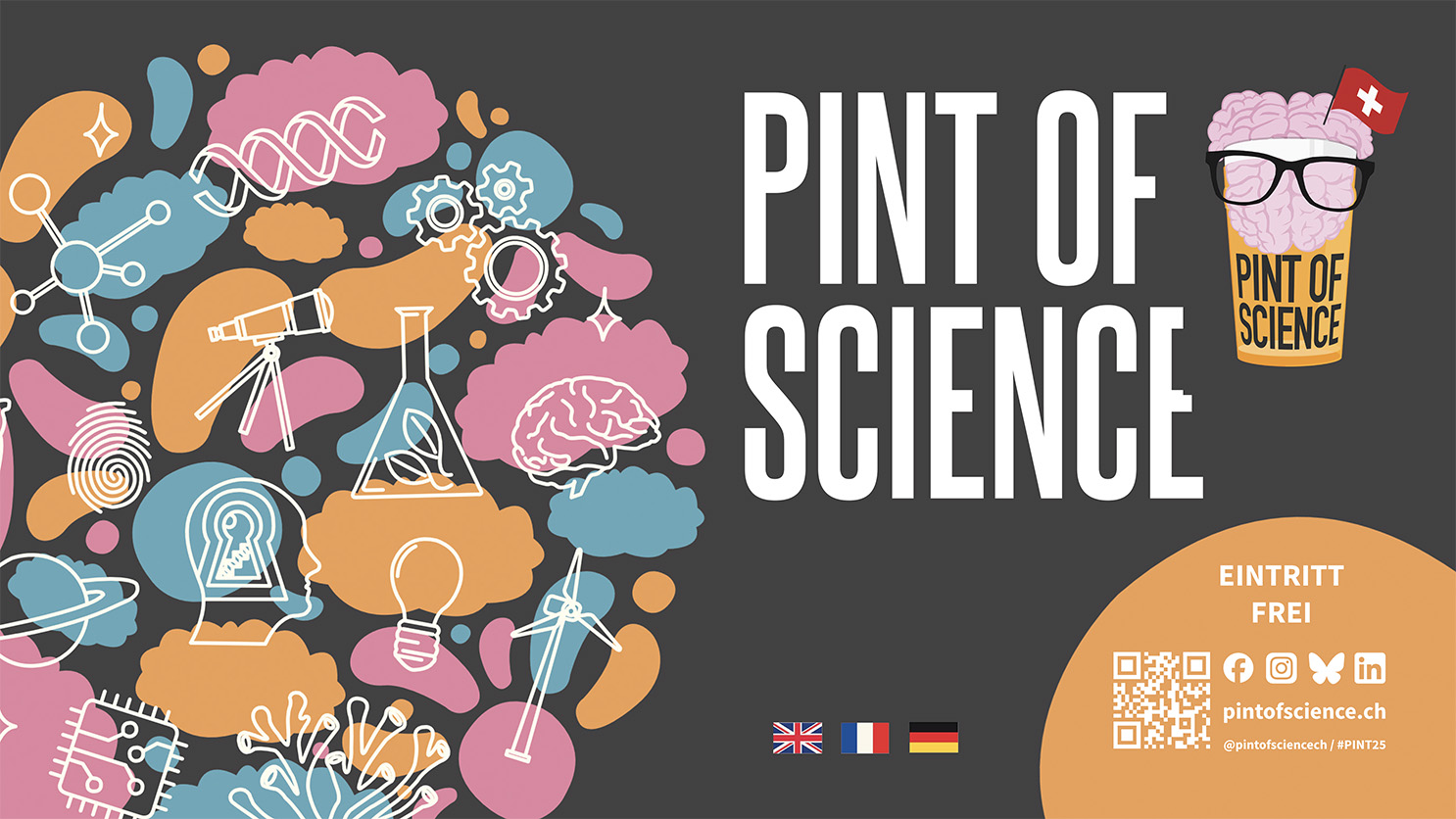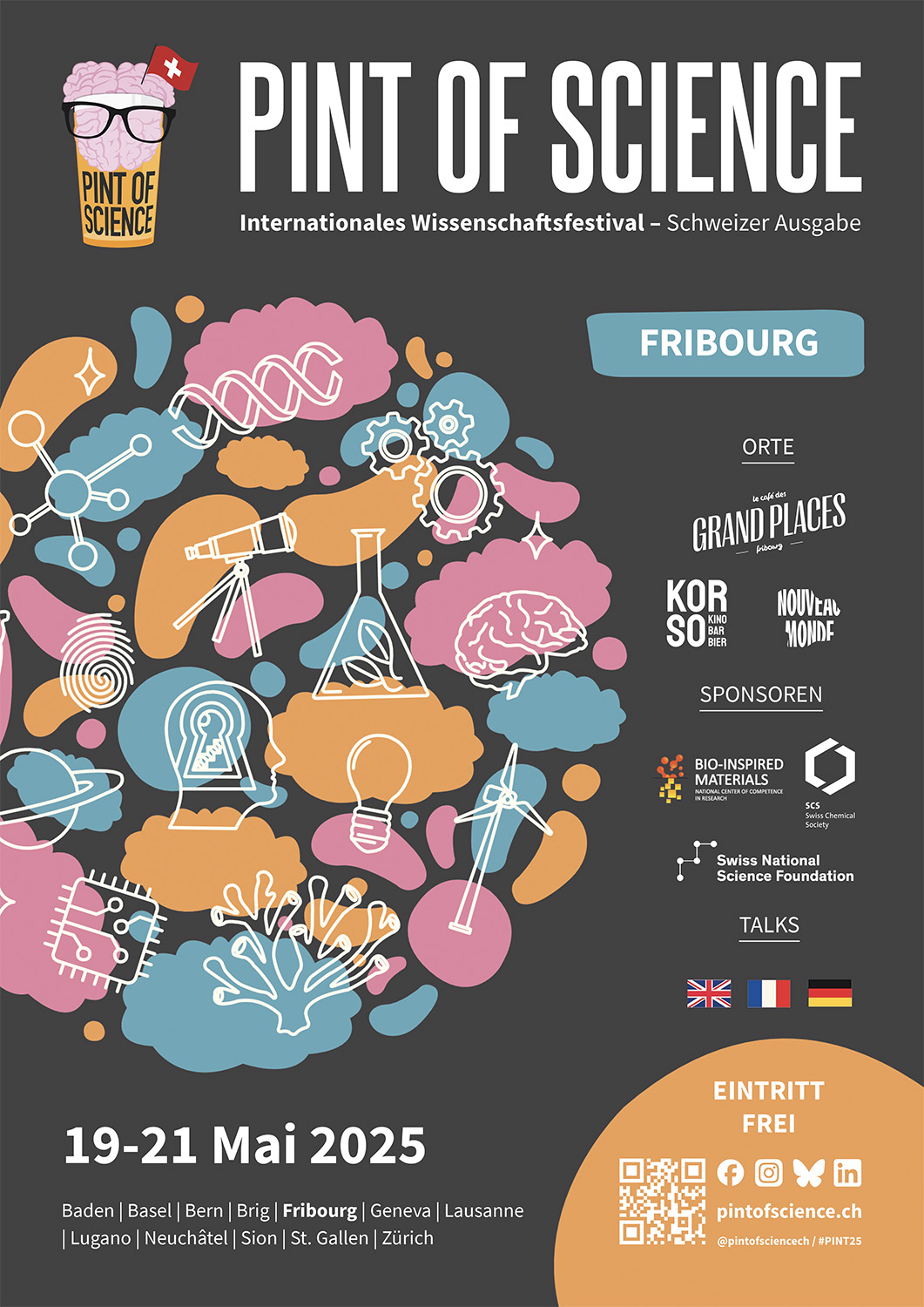Pint of Science

Lundi 19 mai à 18h30
From propaganda to perception: AI that thinks like us
Language: English
By Prof. Liudmila Zavolokina (University of Lausanne)
www.zavolokina.com
“Can AI make us better news readers? Designing an automated propaganda detection tool.”
As propaganda gets more sophisticated and news consumption gets faster, I wondered: how can we help people slow down and think more critically? In this talk, I'll share insights from my research on designing an AI tool that detects propaganda and explains it to the reader in real time. Along the way, my research team encountered unexpected challenges - between speed and reflection, automation and agency, trust and transparency. It's not about fixing the way people read, it's about designing technology to support their thinking. What we found challenged our assumptions about AI and ourselves.
Prof. Edy Portmann (University of Fribourg)
www.edyportmann.ch
“Computing with Words and Perceptions”
In his talk, Edy Portmann presents the way of a fuzzy thinker towards a computing with words and perceptions. Fuzzy logic is a way of doing science without math, it’s a branch of explainable artificial intelligence that tries to make computer systems think the way humans do and not the other way round. Thereby, fuzzy logic provides a natural gateway to move from a sole measurement-based to a perception-based computer science. In the end, this will enable more resilient tech innovations.
Mardi 20 mai à 18h30
Vor lauter Bäumen kein Wald mehr? Das Anthropozän als fehlgeleitete Utopie
Sprache: Deutsch
Prof. Gregor Kozlowski (University of Fribourg)
https://www.zelkova.ch/
“Vom Planeten der Bäume zum Planeten der Affen”
Der Vortrag stellt die Entwicklung der Vegetation auf der Erde vor – von der ersten Besiedlung der Landflächen vor Hunderten Millionen Jahren bis zu den globalen Veränderungen, die durch den Menschen verursacht wurden. Besonders im Fokus stehen dabei Bedeutung und Besonderheiten der Bäume. Bis vor wenigen zehntausend Jahren dominierten Bäume und andere Gehölze die terrestrischen Ökosysteme. Auch in unserer modernen Welt bilden sie die Grundlage der biologischen Vielfalt – und sind damit auch für uns Menschen unentbehrlich.
Prof. Ivo Walliman-Helmer
https://www.unifr.ch/env/en/about/members/people/200532/40c4c
“Wie wäre es mit Hoffnung im Anthropozän?”
Wissenschaftlich gesprochen steht das Anthropozän für das Erdzeitalter in dem der Mensch unseren Planeten erstmals als treibende Kraft verändert hat. Häufig wird das Anthropozän aber auch mit ökologischen Krisen verknüpft und als negative Utopie verstanden, die es zu überwinden gilt. Ich argumentiere gegen diese negative Utopie und dafür, auch hoffnungsvoll auf das Anthropozän zu schauen. Denn nur die Hoffnung im Grossen und Kleinen führt eine Veränderung hin zum besseren herbei.
Mercredi 21 mai à 18h30
Aides invisibles : comment les microorganismes modèlent notre alimentation et notre environnement
Langue: Français
Pascal Fuchsmann (Head of Flavour Analytics, Agroscope)
http://www.agroscope.ch/
“Fermentation : l'art des microorganismes pour sublimer les arômes et protéger notre santé”
La fermentation est un processus millénaire qui repose sur l'action des microorganismes pour transformer les aliments. Bien plus qu'une simple technique de conservation, elle révèle des qualités aromatiques uniques tout en apportant des bienfaits pour notre santé. Les bactéries, levures et moisissures, véritables artisans de la fermentation, transforment les macronutriments en composés aromatiques complexes, donnant naissance à des produits aux saveurs intenses et variées. En parallèle, ces microorganismes jouent un rôle crucial dans la préservation de notre bien-être en favorisant la digestion et en renforçant notre microbiote intestinal. Découvrons comment cet art naturel sublime les arômes et protège notre santé.
Dr. Mout De Vrieze (Agroscope)
@mout_and_the_potatoes (instagram)
“La patate contre-attaque: opération microbiote contre mildiou”
Imaginez un climat toujours plus imprévisible… et des agriculteurs qui doivent malgré tout protéger leurs pommes de terre contre la redoutable maladie du mildiou. Les solutions classiques, comme les pesticides, sont de plus en plus remises en question à cause de leurs impacts sur l’environnement et la santé. Il faut donc trouver des alternatives. Mais où chercher ? Et si la réponse se trouvait… sur la patate elle-même ? En explorant le microbiote naturel de ses feuilles, nous cherchons des micro-organismes capables de freiner — ou bloquer — le mildiou. Une piste prometteuse, pour éviter que nos patates ne finissent prématurément en purée !
From propaganda to perception: AI that thinks like us
Language: English
By Prof. Liudmila Zavolokina (University of Lausanne)
www.zavolokina.com
“Can AI make us better news readers? Designing an automated propaganda detection tool.”
As propaganda gets more sophisticated and news consumption gets faster, I wondered: how can we help people slow down and think more critically? In this talk, I'll share insights from my research on designing an AI tool that detects propaganda and explains it to the reader in real time. Along the way, my research team encountered unexpected challenges - between speed and reflection, automation and agency, trust and transparency. It's not about fixing the way people read, it's about designing technology to support their thinking. What we found challenged our assumptions about AI and ourselves.
Prof. Edy Portmann (University of Fribourg)
www.edyportmann.ch
“Computing with Words and Perceptions”
In his talk, Edy Portmann presents the way of a fuzzy thinker towards a computing with words and perceptions. Fuzzy logic is a way of doing science without math, it’s a branch of explainable artificial intelligence that tries to make computer systems think the way humans do and not the other way round. Thereby, fuzzy logic provides a natural gateway to move from a sole measurement-based to a perception-based computer science. In the end, this will enable more resilient tech innovations.
Mardi 20 mai à 18h30
Vor lauter Bäumen kein Wald mehr? Das Anthropozän als fehlgeleitete Utopie
Sprache: Deutsch
Prof. Gregor Kozlowski (University of Fribourg)
https://www.zelkova.ch/
“Vom Planeten der Bäume zum Planeten der Affen”
Der Vortrag stellt die Entwicklung der Vegetation auf der Erde vor – von der ersten Besiedlung der Landflächen vor Hunderten Millionen Jahren bis zu den globalen Veränderungen, die durch den Menschen verursacht wurden. Besonders im Fokus stehen dabei Bedeutung und Besonderheiten der Bäume. Bis vor wenigen zehntausend Jahren dominierten Bäume und andere Gehölze die terrestrischen Ökosysteme. Auch in unserer modernen Welt bilden sie die Grundlage der biologischen Vielfalt – und sind damit auch für uns Menschen unentbehrlich.
Prof. Ivo Walliman-Helmer
https://www.unifr.ch/env/en/about/members/people/200532/40c4c
“Wie wäre es mit Hoffnung im Anthropozän?”
Wissenschaftlich gesprochen steht das Anthropozän für das Erdzeitalter in dem der Mensch unseren Planeten erstmals als treibende Kraft verändert hat. Häufig wird das Anthropozän aber auch mit ökologischen Krisen verknüpft und als negative Utopie verstanden, die es zu überwinden gilt. Ich argumentiere gegen diese negative Utopie und dafür, auch hoffnungsvoll auf das Anthropozän zu schauen. Denn nur die Hoffnung im Grossen und Kleinen führt eine Veränderung hin zum besseren herbei.
Mercredi 21 mai à 18h30
Aides invisibles : comment les microorganismes modèlent notre alimentation et notre environnement
Langue: Français
Pascal Fuchsmann (Head of Flavour Analytics, Agroscope)
http://www.agroscope.ch/
“Fermentation : l'art des microorganismes pour sublimer les arômes et protéger notre santé”
La fermentation est un processus millénaire qui repose sur l'action des microorganismes pour transformer les aliments. Bien plus qu'une simple technique de conservation, elle révèle des qualités aromatiques uniques tout en apportant des bienfaits pour notre santé. Les bactéries, levures et moisissures, véritables artisans de la fermentation, transforment les macronutriments en composés aromatiques complexes, donnant naissance à des produits aux saveurs intenses et variées. En parallèle, ces microorganismes jouent un rôle crucial dans la préservation de notre bien-être en favorisant la digestion et en renforçant notre microbiote intestinal. Découvrons comment cet art naturel sublime les arômes et protège notre santé.
Dr. Mout De Vrieze (Agroscope)
@mout_and_the_potatoes (instagram)
“La patate contre-attaque: opération microbiote contre mildiou”
Imaginez un climat toujours plus imprévisible… et des agriculteurs qui doivent malgré tout protéger leurs pommes de terre contre la redoutable maladie du mildiou. Les solutions classiques, comme les pesticides, sont de plus en plus remises en question à cause de leurs impacts sur l’environnement et la santé. Il faut donc trouver des alternatives. Mais où chercher ? Et si la réponse se trouvait… sur la patate elle-même ? En explorant le microbiote naturel de ses feuilles, nous cherchons des micro-organismes capables de freiner — ou bloquer — le mildiou. Une piste prometteuse, pour éviter que nos patates ne finissent prématurément en purée !

Science et bière
Du 19 au 21 mai à 18h30
Organisé par pintofscience.ch
Chaque jour un sujet différent dans une langue différente pour parler autour d'une bière.
Lundi : Propagande et perception de l'IA en anglais.
Mardi : L'Utopie anthropocène des arbres en allemand.
Mercredi : Microorganismes, alimentation et environnement en français.
Chaque jour un sujet différent dans une langue différente pour parler autour d'une bière.
Lundi : Propagande et perception de l'IA en anglais.
Mardi : L'Utopie anthropocène des arbres en allemand.
Mercredi : Microorganismes, alimentation et environnement en français.
